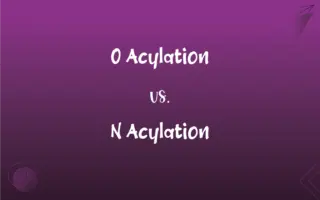Germination vs. Emergence: What's the Difference?
Edited by Aimie Carlson || By Janet White || Published on April 14, 2024
Germination is the process of a seed developing into a new plant, while emergence is the stage when the sprout breaks through the soil surface.

Key Differences
Germination is the initial phase in the life cycle of a plant, beginning when conditions are right for a seed to activate and start growing. This process involves the seed absorbing water, swelling, and eventually breaking through its coat as it begins to sprout. Emergence, on the other hand, refers specifically to the moment a new plant breaks through the soil surface, marking its entry into the external environment. This is a crucial stage where the young plant begins photosynthesis.
The process of germination is internal and can occur in various environments, not just soil, as long as moisture, oxygen, and suitable temperatures are present. It is a critical period of water absorption, enzyme activation, and initial root and shoot development within the seed. Emergence, however, is an external process that visibly confirms the successful germination and initial growth of the plant. It signifies the plant's readiness to start photosynthesis, crucial for its further growth and development.
Germination encompasses several stages, starting from imbibition, where the seed absorbs water, followed by the activation of metabolism and culminating in the radicle (the embryonic root) breaking through the seed coat. These stages are internal and not visible from the outside. Emergence is the culmination of these internal processes and is the first visible sign of a plant's life cycle progressing, as the shoot reaches the soil surface and the first leaves begin to unfold.
Germination is focused on the seed turning into a young plant, emergence is more about the young plant adapting to its environment. After emergence, the plant continues to grow, developing more leaves and strengthening its root system. The success of emergence is influenced by factors like soil type, depth of planting, and moisture levels, which can significantly affect the young plant's ability to reach the soil surface and thrive.
Germination is the set of internal processes that start with a dormant seed and end with a young sprout, ready to break through the soil. Emergence is the phase where the sprout actually breaks through the soil, marking its transition from an embryonic stage to an independent plant capable of photosynthesis. Both are crucial steps in the life cycle of plants, setting the foundation for healthy growth and development.
ADVERTISEMENT
Comparison Chart
Definition
The process of a seed developing into a new plant
The stage when the sprout breaks through the soil surface
Stage
Initial stage in plant development
Follows germination; visible growth stage
Visibility
Internal processes, not visible from outside
Visible as the plant breaks through the soil
Environment
Can occur in various environments
Typically occurs in soil
Significance
Marks the beginning of plant growth from a seed
Indicates the plant's readiness for photosynthesis
ADVERTISEMENT
Germination and Emergence Definitions
Germination
Germination is the first step in a plant's life cycle.
He noted the germination rate of each seed variety in his garden journal.
Emergence
Emergence depends on soil conditions and planting depth.
The careful planting ensured the rapid emergence of the lettuce.
Germination
Germination is the process of a seed beginning to grow.
After planting the seeds, she eagerly awaited their germination.
Emergence
Emergence is the stage when a plant first appears above the soil.
The emergence of the seedlings was a sign that spring had truly arrived.
Germination
Germination involves the absorption of water by the seed.
The germination of the bean seeds was evident when they swelled and cracked open.
Emergence
Emergence is a critical stage for plant survival.
The gardener monitored the emergence of the flowers daily, looking for signs of growth.
Germination
Germination activates the seed's metabolism.
The warmth of spring triggered the germination of the wildflowers.
Emergence
Emergence marks the beginning of photosynthesis in young plants.
With the emergence of the first leaves, the plants began to harness sunlight.
Germination
Germination ends when the embryonic root emerges.
The germination of the corn seeds was successful, as seen by the emerging radicles.
Emergence
Emergence signals the successful establishment of a plant.
The emergence of the tomato plants from the soil filled the farmer with pride.
Germination
To cause to sprout or grow.
Emergence
The act or process of emerging.
Germination
To begin to sprout or grow.
Germination
To come into existence
An idea germinated in his mind.
Germination
The process of germinating; the beginning of vegetation or growth from a seed or spore; the first development of germs, either animal or vegetable.
Germination
The process of germinating; the beginning of vegetation or growth in a seed or plant; the first development of germs, either animal or vegetable.
Germination
The process whereby seeds or spores sprout and begin to grow
Germination
The origin of some development;
The germination of their discontent
FAQs
What conditions are necessary for germination?
Suitable moisture, temperature, and oxygen levels.
How does germination differ from emergence?
Germination is the internal process of growth within a seed; emergence is the sprout breaking through the soil.
What is emergence in plants?
When the sprout breaks through the soil surface, becoming visible.
Can germination occur without soil?
Yes, seeds can germinate in various media as long as conditions are met.
Can all seeds germinate?
Most can, but some require specific conditions or treatments to overcome dormancy.
Does emergence guarantee a healthy plant?
Not always; subsequent growth depends on ongoing suitable conditions.
What is germination?
The process where a seed absorbs water and begins to grow into a new plant.
How deep should seeds be planted for effective emergence?
It varies by species; too deep can hinder emergence, too shallow can dry out the seed.
What factors affect emergence?
Soil type, planting depth, moisture, and temperature.
What is the significance of the first leaves after emergence?
They start photosynthesis, crucial for the plant's energy.
What happens after emergence?
The plant continues to grow, developing leaves and strengthening its root system.
Is emergence a sign of successful germination?
Yes, it indicates the seed has successfully sprouted and reached the soil surface.
How long does germination take?
It varies by plant species and environmental conditions.
Why is moisture crucial for germination?
It activates enzymes that start the growth process.
Can germination occur underwater?
Some seeds can germinate in water, but most require air for respiration.
What role does temperature play in germination and emergence?
It affects the rate of metabolic activities necessary for growth.
What challenges do plants face after emergence?
They must adapt to external conditions, including light, temperature, and potential pests.
Can germination occur in darkness?
Yes, light is not required for most seeds to germinate.
How do you measure germination rate?
By counting the number of seeds that germinate over a given period.
How can emergence be improved?
By optimizing soil conditions, planting depth, and watering.
About Author
Written by
Janet WhiteJanet White has been an esteemed writer and blogger for Difference Wiki. Holding a Master's degree in Science and Medical Journalism from the prestigious Boston University, she has consistently demonstrated her expertise and passion for her field. When she's not immersed in her work, Janet relishes her time exercising, delving into a good book, and cherishing moments with friends and family.
Edited by
Aimie CarlsonAimie Carlson, holding a master's degree in English literature, is a fervent English language enthusiast. She lends her writing talents to Difference Wiki, a prominent website that specializes in comparisons, offering readers insightful analyses that both captivate and inform.






































































